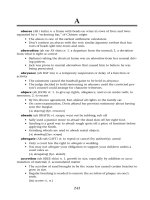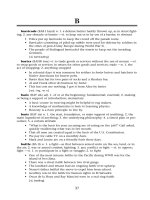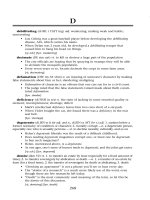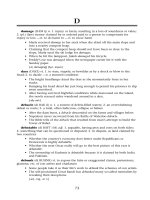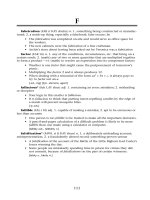Jobhunting in Today’s New World
Bạn đang xem bản rút gọn của tài liệu. Xem và tải ngay bản đầy đủ của tài liệu tại đây (94.73 KB, 9 trang )
Chapter 1
Jobhunting in Today’s New World
Since the first edition of our book was published, the world has witnessed signif-
icant changes, many of which have had a dramatic effect on the job market. Some
were predictable: advances in technology, the economic downturn, mergers, ac-
quisitions, and bankruptcies. Others were unimaginable: terrorist attacks, embez-
zlement, and the falsification of corporate records.
As we write, the U.S. unemployment rate is high. Companies have become
conservative in recruiting and hiring in general as well as within specific sectors
and industries. In the airline industry, for example, job growth is weak. In law en-
forcement, it’s stronger. Some financial firms are desperately looking for seasoned
professionals while others are downsizing. Fields such as pharmaceuticals, nurs-
ing, and assisted living, that market to aging populations, are either enjoying
growth or planning for it as 76 million Baby Boomers approach retirement age. On
the other hand, the group that demographers call the “Baby Echo” (Boomers’ chil-
dren) is off to college in droves. Once these graduates enter the workforce, it may
well trigger growth in industries more dependent on the spending habits of those
in their twenties.
Nevertheless, opportunity does exist in the workplace—just not where it has
traditionally been! New jobs are being created as start-ups launch and relaunch,
as required skills shift from industry to industry and within sectors, and as grow-
ing numbers of workers retire.
The good news is that what you must do to conduct an effective job search
has not changed. What has changed is how you must do it and how much of it you
must do.
Here are several essential guidelines for managing the successful job search
in today’s challenging, new world.
1
02 6/27/03 9:20 AM Page 1
Copyright 2003 by The McGraw-Hill Companies, Inc. Click Here for Terms of Use.
DEVELOP A 10-MONTH PLAN
In today’s challenging job market, many jobhunters are finding that the search
takes somewhat more time than it did in the past. Regardless of what expectations
you may have or may hear, assume a time frame of at least 10 months for your
search. Then, set consistent and realistic daily objectives—ones you can sustain
throughout that period. Chances are, you’ll find that your job search is less like a
sprint and more like a marathon. Don’t expect to reach the finish line in a day. In-
stead, expect to reach for and achieve daily goals—such as networking with 5 con-
tacts per day or 10 new contacts per week. Without this attitude, you’ll view every
day as a laborious burden that does not produce results. You’ll risk losing focus,
motivation, and direction. You’ll neither write nor interview well, and your search
may take even longer.
2
A PERSONAL NOTE FROM THE AUTHOR
Since we published the first edition of this book, the company for which I
worked made a major acquisition. As a result, my position was eliminated.
To my surprise and chagrin, I found myself in the job market once again.
Although there is never a good time to be out of work, I was one of many,
many others who discovered that the timing couldn’t have been worse. I was
forced to begin my job search in September of 2001 as a deeply stunned
America struggled to regain its footing and courage in a shocking new world.
Nevertheless, I started a new job in June of 2002. What happened in between
went literally “by the book.” And by that, I mean this book! I used every type
of letter, every tactic and tip that we recommended to you in the first edition
of 201 Killer Cover Letters! Not only are the letters and advice still applicable,
advances in technology have made the job search easier...even in today’s
challenging economy. That’s why, in this new edition, you’ll find guidelines
for jobhunting in today’s new world along with samples of letters formatted
for e-mail and designed to help you secure jobs that didn’t exist 10 years ago!
Above all, my own job search convinced me that before you launch yours,
you must take the time to develop a plan for achieving success. This, I found,
must spring from an attitude of success. Where to start? Take a look at the
guidelines I developed, employed, and profited from—we’ve included them
in this new edition—they’re sure to save you time and trouble.
—Andrea Paxton
02 6/27/03 9:20 AM Page 2
ACCEPT HELP
Should your previous employer offer you the benefit of outplacement services,
seize this valuable opportunity. Explore the resources of federal and local labor
departments as well as any associations, unions, or industry groups of which you
are a member. Many organizations offer free training programs for which you
may be eligible. Investigate every resource that’s offered to you, and then decide
which ones may suit your needs.
ASSESS YOUR SKILLS
Identifying your unique skills, strengths, and traits can be difficult. It’s not diffi-
cult because you don’t possess any, but because so often we take our own capa-
bilities for granted. So spend some time considering your skills—or ask a friend
or colleague to help you. Jot them down from the most simple (“I can use a com-
puter.”) to the more complex (“I am an ex-
pert in Microsoft Access, PowerPoint, and
Publisher.”) to the truly astonishing (“I
brought in $25 million in new business as
a direct result of my Mercury program-
ming capabilities.”). For help, be sure to
use the worksheets in Chapter 3—you can
complete them on your computer by using
the enclosed CD-ROM. Once you’ve writ-
ten down (or typed up) your skills, you
can then decide which ones are relevant to
the various positions for which you may
apply. This becomes especially important
if you’re transferring skills to a new job or
industry. In every case, identifying what
you can do and what sets you apart from
other candidates is essential.
NETWORK, NETWORK,
NETWORK
You can’t start soon enough or do too
much networking. You’re planning your
future, after all, so take charge! Begin by
listing all the people to whom you can
talk. Not only those who may have the job
3
HOW TO RIDE THE
AGE WAVE
Whether you’re 25 or 75, age
may play a role in your job
search despite the fact that the
law prohibits age discrimina-
tion. So be sure to complete the
worksheets in Chapter 3. Your
youth may account for more
advanced computer skills, an
understanding of current in-
dustry initiatives, or “New
Age” management techniques.
Your maturity may suggest
more in-depth knowledge, a
historic perspective of your in-
dustry or specialty, or experi-
ence managing people and
change. Plus, energy, enthusi-
asm, and adaptability are age-
less. So don’t shortchange your-
self—get comfortable with your
strengths!
RECRUITER’S TIP
02 6/27/03 9:20 AM Page 3
you want. Anyone and everyone can spread the word that you are—or will be—
searching for a new position. Whether it’s passing along your resume, providing
a referral or simply keeping you in mind should an opportunity arise to mention
your name, there’s something for everyone to do! As soon as you know you’ll be
looking, draft your list. Begin with the names of friends and family. To that, add
current work contacts, previous employers, co-workers, fellow alumni, and so on.
Always carry index cards for jotting down names, phone numbers, and e-mail ad-
dresses of those who are willing to offer assistance—you never know whom you’ll
meet so be prepared. Print up “business cards” to distribute at opportune
moments; these should provide your name, e-mail address, address, and phone
number(s) along with a very brief description of the type of position you seek.
Seize every opportunity to network—including holidays, conventions, weddings,
and reunions when you’re likely to encounter people you don’t see regularly.
FOLLOW UP RIGOROUSLY
In any jobhunting environment—but especially in a tough one—following up
after an interview is imperative. It’s a safe bet that most people don’t write
after an interview, and if they do, they
dash off predictable, trite letters that do
nothing to remind the interviewer how
singularly qualified they are for the posi-
tions they desire. So you must never fail
to write a strong, well-planned follow-
up letter. You must also follow through
with thank-you notes to anyone who
offered help and referrals or served as a
reference. In a tough market, the number
of interviews you have may be limited.
That means you’ll have more time
between them, and that deprives you of
any excuse for not writing! This is par-
ticularly true since e-mail can make fol-
lowing up quicker and simpler. Once
your search is over (and it will be!) be
certain to inform and thank all those who
offered encouragement, contacts, sup-
port, and even those who were willing to
help but didn’t, for whatever reason.
You never know when your next job
search may begin.
4
MONEY MAKES THE
WORLD GO ‘ROUND...AND
YOUR HEAD SPIN
Conventional wisdom says that
the person who mentions the
first figure will ultimately lose in
salary negotiation. So what do
you do when an ad warns “seri-
ous candidates will provide cur-
rent salary and requirements”?
Do some digging. Use the Inter-
net to research salaries for simi-
lar positions in your area. In-
clude benefits and bonuses to
increase your salary. Provide a
salary range to avoid overpric-
ing yourself. The Issue Index
lists letters in this book with
sample language you can use.
RECRUITER’S TIP
02 6/27/03 9:20 AM Page 4
EXPECT TO BE CHECKED
Be sure to read Chapter 2, “The Top 10 Rules for Writing Killer Cover Letters.”
Every rule is vital to an effective job search. Recent events illustrate just how vital.
Take the following rule, for example: “Tell the Truth or Pay the Consequences.”
This rule is crucial in light of today’s corporate scandals, a by-product of which is
the fact that background checks are now conducted with greater regularity and
greater scrutiny. Therefore, if there is anything questionable in your past or any-
thing that might be misconstrued, don’t hope it won’t be discovered. State it your-
self—it’s the only way you can control how this information is presented! Telling
your next employer up-front what she will discover anyway can only make you
appear honest and trustworthy. If you’re lucky, you’ll find that your next boss is
someone who believes that everyone deserves a second chance!
TAKE ADVANTAGE OF TECHNOLOGY
The Internet and the World Wide Web offer astonishing benefits to jobhunters. Be
certain to avail yourself of these new technologies. Whether you’re new to the
Web or a skilled user, take time to master the Internet as a job search tool. An im-
portant part of your search involves identifying organizations that might be hir-
ing. The Internet makes this easier than it’s ever been before. You’ll find dozens of
jobhunting sites on the Web. If you’re not certain where to start, visit any search
engine and enter the word “jobs” or “career.” You ’ll find links that will transport
you to hundreds of valuable resources. Choose one jobhunting Web site and prac-
tice navigating through it. Do the same with the Web site of an organization for
which you’d like to work. Visit its home page and career center. Become familiar
with the firm, the types of openings it is attempting to fill, and the qualifications
it seeks in the ideal candidate for those positions. Also look for Web sites hosted
by associations that exist within your industry or specialty, or your alma mater; fre-
quently, such sites maintain a job bank and referral network or offer training. The
Internet is an amazing source of information, career advice and assistance, com-
pany Web sites, job postings, and sometimes, total confusion. It’s worth your time
up-front to master this vital tool so that you can use it to your benefit.
LEARN HOW TO USE E-MAIL
If you don’t know how to use e-mail, do whatever you must to learn. Not only has
it become ubiquitous in the workplace, e-mail delivers advantages that can prove
pivotal to your job search. For starters, making cold calls or attempting to secure
face-to-face meetings with busy executives is not at the top of most of our lists of
thrilling activities. But now that it is perfectly acceptable—in fact, even prefer-
able—to compose and send brief e-mail notes, networking has become far, far eas-
5
02 6/27/03 9:20 AM Page 5



